A Mean Spirited First Week Back At Parliament
The peace and good will of the Christmas season evaporated in a storm of hysterical speeches in Parliament and rancid recriminations following yet another Dr Don Brash, Orewa speech.
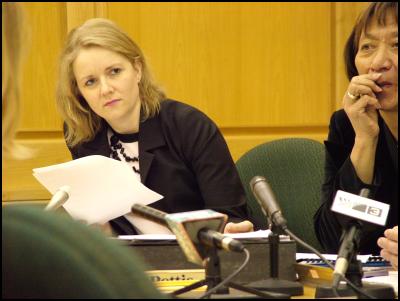
Click for big version
Katherine Rich and Georgina Te Heuheu (partially obscured)
The importance of sticking to the party line and agreeing with every tiny aspect of the National Party leader's vision became obvious early in the week with the dismissal of Katherine Rich as the National Party's welfare spokeswoman. Ms Rich's unease at some of the policies advocated by Dr Brash regarding woman and the DPB led to something of a meltdown in relations between Dr Brash and Ms Rich.
Whilst many pundits suggested there was more than just one part of Dr Brash's speech that Rich took offence to, it was the part in his Orewa address relating to cutting the DPB to women who get pregnant whilst already on the DPB that caused most concern for Ms Rich.
Whilst being interviewed by Linda Clark on National Radio it became obvious that this part of Dr Brash's welfare vision was based more on Dr Brash's gut feelings than any hard and fast research. In the face of tough questioning by the dogged Ms Clark, Dr Brash was unable to point to where his punitive policies had worked, or any research whatsoever to back his Orewa oratory.
Mini Skirted 90s Chief Executive Backs Dr
Brash 100%
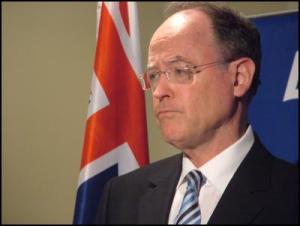
Dr Don's Orewa Oratory Loses Him Another Spokeswoman
Dr Brash's call to increase child poverty was however supported by former head of WINZ, Christine Rankin, who told Paul Holmes on Newstalk ZB that Dr Brash had "hit the nail on the head" with his speech and that "the welfare benefit"was "regular and comfortable". Ms Rankin also pointed out that she herself had been on the benefit… once. Ms Rankin failed to point out that this had occurred sometime before welfare benefits were slashed in the early 1990s.
Whilst Dr Brash has got welfare onto the front pages in recent weeks, little has been heard of another of Dr Brash's policies to get more kiwi's into work – cutting the minimum wage.
Shortly after his election to Parliament, Dr Brash talked to Sunday Star Times journalist, Anthony Hubbard, about his concern for the unemployed. Although Dr Brash had been gainfully employed as Reserve Bank Governor for more than a decade before entering Parliament, he sympathised with those less fortunate than himself.
"To me, being unemployed month after month must be the most horribly demoralising experience." Dr Brash said.
He also told Anthony Hubbard a drastic solution might be necessary
"The most important thing of all is to get people into work, and if no employer is willing to employ them at the statutory minimum wage, then maybe we should look at the question and find alternative ways to supplement their income."
Whether Dr Brash's radical solution wins any favour with the mythical 'kiwi battlers' working for eight dollars an hour to support idle, stoned Sky TV watching beneficiaries (as portrayed by National's new welfare spokesperson Judith Collins) remains to be seen.
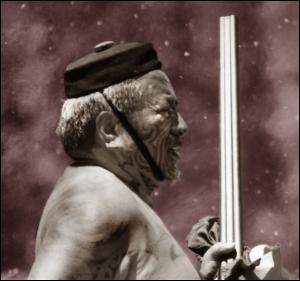
Click for big version
Tame Iti At The Tuhoe Hearings – Source Aocafe.com
Late in the week hard working, Judge Dreddish ACT justice spokesperson, Stephen Franks, collared yet another 'perp' in the form of tattooed Tuhoe activist, Tame Iti. Mr Franks was incensed after he spotted Mr Iti terminating a New Zealand flag with extreme prejudice on the telly one evening in January. The shotgun massacre of New Zealand's flag had apparently gone unpunished by police on the day. Mr Franks brought the matter to Parliament's attention and pointed out how the police had arrested a peaceful demonstrator protecting his car some four months ago.
"Why is the Minister bothering to tinker with more rules for the Arms Act when the existing Act has powers of search and seizure without warrant, and when only 4 months ago the police managed to arrest immediately a peaceful demonstrator who had the misfortune to be attacked by a mob the police could not protect him against, and who stood on the bonnet of his car as bottles were thrown at him, and he was convicted for possessing a tiny knife in the car?" Mr Franks demanded of Police Minister, George Hawkins on Wednesday.
Who was this peaceful man arrested for possession of one teensy, tiny knife? Surely this mild mannered individual couldn't have been the angry national front member swinging a baseball bat atop his car roof during a fracas with some anarchists following an anti-racism march?
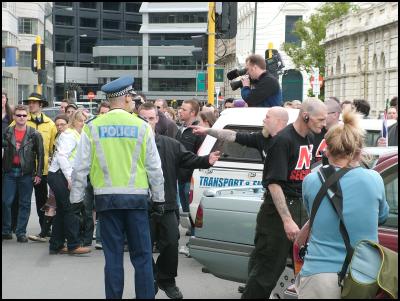
Images: Fairies Against Fascism Vs National Front
More Images
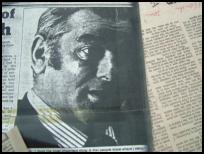
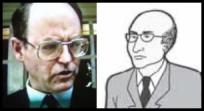
A Selection of three MP's allegedly unsympathetic to Maori interests
Meanwhile…
The political week kicked off with a brilliantly lame story about a question in an NCEA paper relating to a National Party MP from 1980 who was allegedly unsympathetic to Maori interests. To further incense those in the National Party in 2005, was the rather poor clip-art that accompanied the NCEA question. The clip art figure was a balding bespectacled figure with flared trousers. Dr Brash considered this caricature bore a remarkable resemblance to him and further considered the clip art caricature to be tall.
Despite angry mutterings from various National MPs that their leader had once again been besmirched by the dark forces of nanny state – history was not on their side. As Dr Brash had been soundly defeated in a by-election in September 1980 by Social Credit candidate and Ralph Nader fan, Garry Knapp, the caricature could not possibly have been an historically accurate depiction
Taking a quick trip down memory lane to 1980 Scoop discovered that the National Party MP most likely to be getting up (some) sections of the Maori populations nose was in fact Maori Affairs minister, Ben Couch. Unlike the bespectacled figure in the NCEA exam (who bears a remarkable resemblance to TVNZ's Garth Bray) however, Mr Couch was a veritable bear of a man. And unlike the current Maori Affairs spokesperson for National, Mr Couch was actually of Maori descent.
Mr Couch had famously stated that he was a New Zealander first and a Maori second, which caused some concern for Maori academic, Ranginui Walker, who considered Mr Couch espoused the Pakeha position and rejected the emerging Maori land rights movement.
Whilst Mr Couch failed to endear himself to some Maori, he was probably not too popular with black South Africans either. Mr Couch was appalled that black African states had the gall to ask NZ to stop sporting contacts with South Africa and accused the news media of negativity in their coverage prior to the Springbok tour.
He accused Maori activists who wanted separate development of having a double standard in condemning apartheid.
It was probably in his role as Police Minister however that Mr Couch's views would have caused most alarm to today's sickly liberals (As Mr Couch probably would have termed them).
In late 1980 Mr Couch recalled the golden days of his youth when a rural constable could administer a good preventive kicking to a wayward youth.
"The Bobby on the beat, the local bobby around town…he did his job without worrying too much about human rights as we have got it today," Mr Couch is quoted as saying.
Sadly those halcyon pro-active policing days of the 50s, fondly remembered by Mr Couch, were long gone by 1980.
"Even in schools you can't touch young Johnny any longer. His mother and father would be up in arms." Mr Couch sadly concluded.
ENDS


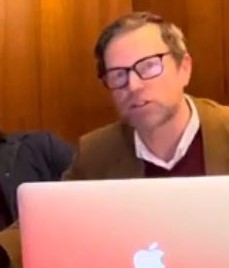
 Ian Powell: The Dirtiest Of Politics And A Tale Of Two MPs Cloaked In Hypocrisy
Ian Powell: The Dirtiest Of Politics And A Tale Of Two MPs Cloaked In Hypocrisy Gordon Campbell: On A Neglected, Enduring Aspect Of The Francis Era
Gordon Campbell: On A Neglected, Enduring Aspect Of The Francis Era Eugene Doyle: 50 Years After The “Fall” Of Saigon - From Triumph To Trump
Eugene Doyle: 50 Years After The “Fall” Of Saigon - From Triumph To Trump Lynley Tulloch: Pulling The Mat Out From Under The Early Childhood Education (ECE) Sector
Lynley Tulloch: Pulling The Mat Out From Under The Early Childhood Education (ECE) Sector Howard Davis: NZSQ Inaugurates Wellington Chamber Music’s New Season
Howard Davis: NZSQ Inaugurates Wellington Chamber Music’s New Season Gordon Campbell: On The Trump Upside, And Peters Persecution Of Trans People
Gordon Campbell: On The Trump Upside, And Peters Persecution Of Trans People